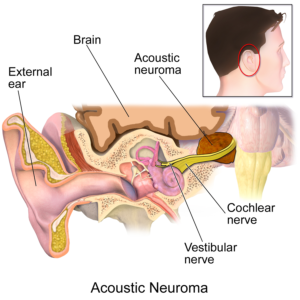
Why suffer the ongoing anxiety of watchful waiting for a small acoustic neuroma when you can just have it be done and over with via transcanal removal?
Watchful waiting may sound like a brilliantly conservative approach that’s risk-free.
Meanwhile, the endoscopic transcanal removal is a groundbreaking minimally invasive surgical technique that does not involve any incisions or penetration into the skull.
If you’re as tough as nails, you won’t mind watchful waiting.
But many people with an acoustic neuroma would have a difficult time dealing with the watchful waiting plan – even though these are slow growing tumors that never spread.
Watchful Waiting vs. Transcanal Removal of Small Acoustic Neuroma
“Interesting risk vs. benefit question – watchful waiting can produce a lot of ongoing anxiety,” says Hamid R. Djalilian, MD, Director of Neurotology and Skull Base Surgery, University of California, Irvine, School of Medicine.
Dr. Djalilian continues, “Small and medium sized tumor, especially in the older population, do not grow 50 percent of the time. Therefore, watchful waiting is done since the chance of growth is small.
“While that may cause some anxiety every six to 12 months when an MRI is performed, it is preferred especially in the older population. If there is growth, then radiation or surgery can be performed.
“The transcanal surgery is only appropriate for very small tumors and patients who have lost their hearing.”
This surgery, though minimally invasive, has a very high likelihood of causing post-op hearing loss in a patient who, pre-surgery, does not have hearing loss.
The risk benefit ratio does not stack up in such a patient. But if they already have hearing loss, there won’t be much to lose.
But even in patients already with hearing loss, this isn’t an automatic gateway to transcanal surgery, but it is something to strongly consider in patients who are not dealing well with the anxiety of watchful waiting and serial MRIs.
“So the transcanal surgery is not a good option for patients who have useful hearing which is defined as word discrimination greater than 50 percent and a hearing level of better than 50 dB,” says Dr. Djalilian.
 Dr. Djalilian’s areas of expertise include complex ear surgery, hearing loss, tinnitus, balance disorders, facial nerve paralysis and skull base surgery. He conducts research in several areas related to cochlear implants and acoustic neuroma.
Dr. Djalilian’s areas of expertise include complex ear surgery, hearing loss, tinnitus, balance disorders, facial nerve paralysis and skull base surgery. He conducts research in several areas related to cochlear implants and acoustic neuroma.
 Lorra Garrick has been covering medical, fitness and cybersecurity topics for many years, having written thousands of articles for print magazines and websites, including as a ghostwriter. She’s also a former ACE-certified personal trainer.
Lorra Garrick has been covering medical, fitness and cybersecurity topics for many years, having written thousands of articles for print magazines and websites, including as a ghostwriter. She’s also a former ACE-certified personal trainer.
.









































